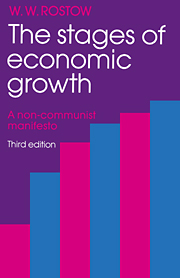Book contents
- Frontmatter
- Contents
- Preface to the Third Edition
- Preface to the Second Edition
- Preface to the First Edition
- 1 INTRODUCTION
- 2 THE FIVE STAGES-OF-GROWTH—A SUMMARY
- 3 THE PRECONDITIONS FOR TAKE-OFF
- 4 THE TAKE-OFF
- 5 THE DRIVE TO MATURITY
- 6 THE AGE OF HIGH MASS-CONSUMPTION
- 7 RUSSIAN AND AMERICAN GROWTH
- 8 RELATIVE STAGES-OF-GROWTH AND AGGRESSION
- 9 THE RELATIVE STAGES-OF-GROWTH AND THE PROBLEM OF PEACE
- 10 MARXISM, COMMUNISM, AND THE STAGES-OF-GROWTH
- Appendix A THE DIFFUSION OF THE PRIVATE AUTOMOBILE
- Appendix B THE CRITICS AND THE EVIDENCE
- Coda: REFLECTIONS ON THE DEBATE AS OF 1990
- Acknowledgments
- Index
Appendix B - THE CRITICS AND THE EVIDENCE
Published online by Cambridge University Press: 05 June 2012
- Frontmatter
- Contents
- Preface to the Third Edition
- Preface to the Second Edition
- Preface to the First Edition
- 1 INTRODUCTION
- 2 THE FIVE STAGES-OF-GROWTH—A SUMMARY
- 3 THE PRECONDITIONS FOR TAKE-OFF
- 4 THE TAKE-OFF
- 5 THE DRIVE TO MATURITY
- 6 THE AGE OF HIGH MASS-CONSUMPTION
- 7 RUSSIAN AND AMERICAN GROWTH
- 8 RELATIVE STAGES-OF-GROWTH AND AGGRESSION
- 9 THE RELATIVE STAGES-OF-GROWTH AND THE PROBLEM OF PEACE
- 10 MARXISM, COMMUNISM, AND THE STAGES-OF-GROWTH
- Appendix A THE DIFFUSION OF THE PRIVATE AUTOMOBILE
- Appendix B THE CRITICS AND THE EVIDENCE
- Coda: REFLECTIONS ON THE DEBATE AS OF 1990
- Acknowledgments
- Index
Summary
AN APPROACH TO THE DEBATE
A good many economists and historians have commented on The Stages of Economic Growth. In replying to the debate, I have grouped the questions raised analytically rather than ad hominem. One or another critic is sometimes strongly associated with a particular line of argument; and this will naturally emerge, where necessary. But my purpose here is to get at certain issues of substance in as constructive a way as I can rather than to perpetuate the title of Henry Rosovsky's engaging review article, ‘The Take-off into Sustained Controversy’ (Journal of Economic History, June 1965, pp. 271–5). I believe that we are at a point in the study of economic growth where a good many of the issues under debate can be resolved or lucidly narrowed in ways which would permit us to get on with the common job from a reasonably common perspective.
I have, therefore, organized this exposition around the following questions of substance:
Is the stages of growth a teleological argument, as Myrdal claims, ‘in which a purpose, which is not explicitly intended by anyone, is fulfilled while the process of fulfillment is presented as an inevitable sequence of events’? (G. Myrdal, Asian Drama, New York, 1968, p. 1851.) Or, in more familiar terms, how self-sustained (or automatic) is self-sustained growth?
Does the stages of growth violate the uniqueness of the historical cases?
- Type
- Chapter
- Information
- The Stages of Economic GrowthA Non-Communist Manifesto, pp. 172 - 241Publisher: Cambridge University PressPrint publication year: 1991



